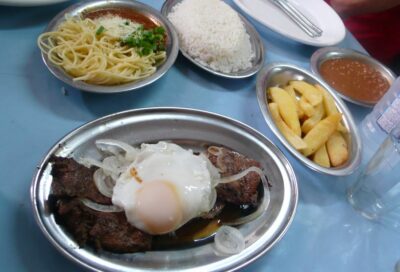
We are pleased to welcome noted culinary linguist Ignacio Caramba, whose syndicated column, “I, Caramba” appears in literally several newspapers around the world.
LEARNING FROM LINGUINE: What does it mean, to be a culinary linguist?
IGNACIO CARAMBA: It means to live in eternal torment.
LFL: Why?
IC: It is a vexation that, in order to study language, we must use language itself. Is this not akin to an automobile mechanic attempting to use his own vehicle to fix other cars? Still, one does what one can, at least most of the time.
LFL: Okay, but what’s the “culinary” part?
IC: We deal with the language of food and its preparation. What people say while they are eating tells us a great deal. Even if we can’t understand them, we can often discern what they are eating, if they speak with their mouths reasonably wide open while chewing. It is unpleasant but it is our job.
LFL: Do different cultures have different words for different kinds of foods?
IC: No, all cultures use the same words for everything. This is a ludicrous question. One is insulted to be asked it.
LFL: No, sorry, what I meant was—
IC: It does not matter what you meant.
LFL: Yes it does!
IC: I am a linguist. I do not care what people mean. I care only about what they say, and whether or not it insults me.
LFL: Do you get insulted a lot?
IC: Not enough, alas.
LFL: Really? Do you like to be insulted?
IC: In fact, I do. When I am insulted, the indignation I experience makes me feel that I have self-respect.
LFL: Huh! Well then, never mind. I’m sure you can’t tell me anything interesting anyway.
IC: That is where you are wrong. I can, indeed, for the languages of the world and of the foods of the world are a bounteous feast of great festive bounty.
LFL: Oh, yeah?
IC: For example, take tuna. Tuna is sometimes referred to as “the chicken of the sea.” Why is this?
LFL: Because everyone likes scrambled tuna eggs?
IC: There is no such dish. Your facetiousness is not appropriate. I am insulted to be its target.
LFL: Yeah, well…
IC: Therefore I will issue a spirited reply. Because tuna is called “the chicken of the sea,” we should not be surprised to learn that chicken is often referred to as “the tuna of the coop.” In a similar fashion, lobster is often addressed as “the veal of the ocean” and veal has the reputation of being “the lobster of the farm.”
LFL: That, um–
CI: Everyone knows that the name for potatoes, in French, is pommes de terre, or “apples of the earth.” But few are aware of the fact that apples are called, Pommes de terre qui–qui peut dire pourquoi?–pour certaines raisons, poussent sur les arbres, or “potatoes which—who can say why?—for some reason, grow on trees.”
LFL: I thought–
IC: This is how the French are. To them, eggs are pommes de terre de le thon de la poulailler, or “apples of the earth of the tuna of the coop,” or, more colloquially, “apples of the chicken.”
LFL: I had no idea.
IC: It is the reason French cooking is so complex. The French word “sauteé” means “jumped,” which is why, for example, when we wish to say in English, “I sauteed the mushrooms,” we say, “I jumped on the mushrooms.”
LFL: We do?
IC: Or let us consider broccoli. The Celtic word for broccoli is “cauliflower of the Leprechauns.” And, for this reason, the Gaelic word for “Leprechauns” is “little, imaginary people who don’t know what cauliflower is.”
LFL: In–
IC: The Spanish word for “oregano” is orégano. No one knows why.
LFL: Maybe–
IC: I will give you one final example before I give you one final example. There is a dish in Portugal and Brazil called Bife a cavalo. In literal translation, which is the worst kind, it means “steak on horseback.” This is triply puzzling, since the dish itself consists of a pan-fried steak with an egg on top.
LFL: Oh! Okay, I see. It’s—
CI: You do not see. There is a paradoxical conundrum in this. It is the egg that is, in fact, on horseback. Except the egg is not on horseback. It is on a steak, which is—unless it is a steak of horse meat, which it is not—a piece of beef. So it is an egg on cowback. But there is no such term, either in English or Portuguese, for “cowback.” Tell me, please: Who would ride a cow? Certainly not an egg. And certainly not cowboys, because, whatever their relation is to cows, they ride on horseback. And do not say, “persons in rodeos,” because they ride bulls. Clearly, “steak on bullback” is an absurdity.
LFL: Okay. Thank you for your time.
IC: Do not thank me for my time. I am insulted.
LFL: I’ll bet.
IC: Everyone has time. What you should thank me for are my insights and ideas and expertise.
LFL: Okay, thanks for all that.
IC: Don’t mention it.

Leave a Reply